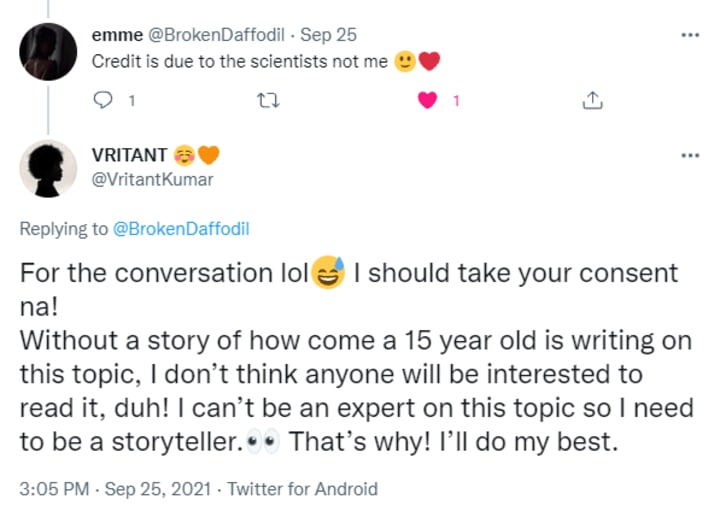
First of all what that “Accidental Thought” was?
That, in its essence, was:
“If I can’t be an expert, I have to be a storyteller.”
Didn’t find what you expected? Do not agree with me? Give me some time.
Let me give you some context for the statement above.
I posted a tweet just out of curiosity and that read:
“DO YOU THINK TAKING STRESS IS BAD ALL OF THE TIMES???
HAS THERE BEEN NO INCIDENT WITH YOU WHERE TAKING STRESS HELPED YOU COMPLETE/ACHIEVE SOMETHING?”
And I least anticipated any serious reply to this tweet, let alone something like this — “Think of it as a bell curve. Look up Yerkes–Dodson Law.”
I was so enthusiastic that I looked it up. Not to mention it was worth checking it out.
In that excitement, I said that I’d write an article on the same and asked for her permission to use our tweets and replies and then she replied: “Credits is due to the scientists and not me.”
Here’s the reply to that:

I think that was more of a subconscious reply than anything else.
This doesn’t mean you should not research thoroughly
A common misunderstanding that I would like to clear beforehand is that this doesn’t mean you should lack that research attitude. Facts are an important aspect of good writing too, and I know that very well. Also, writing in some disciplines require you to be specific, serious and an expert. I’m not referring to those specialised writings.
This is what I might be thinking when I typed that reply:
I wanted to write an article that will revolve around the context of Yerkes–Dodson Law but I thought that would be a little too scientific and detailed than necessary, and I was not that qualified either, I’m only 15 at the moment.
Then something interesting popped into my mind.
Most of us don’t want to know more about Yerkes–Dodson Law than its one (or probably two) line defining statement. We are not interested in reading all the papers that are published around it or when those scientists were born.
We don’t want to know those things. Right?
What we are more interested in reading is that how we can use that law to be more productive in real life and handle stress consciously.
For your reference here is that statement of Yerkes–Dodson Law.
The law dictates that performance increases with physiological or mental arousal, but only up to a point. When levels of arousal become too high, performance decreases.
You don’t want those graphs and all to understand that; we can all relate to it. And unless you’re researching on the topic, you’ll never need to know more than this.
That means that it’s okay, most of the time, to not be an expert cause we don't want expert advice, right?
How this is useful in writing?
We can leverage the above idea into the field of writing too.
I had this notion that one has to be an expert in the field to write about it, but guess what, in reality, you don't.
It’s completely the opposite of that.
In most cases, you don’t have to be an expert. You just need to be relatable and that is not possible without the art of storytelling.
Give some context. Tell them a story they can relate to. Speak their language. And you don’t have to be an expert.
Here are some useful takeaways for you.
Key takeaways:
- Don’t think that you have to be an expert to write on that XYZ topic. Most of the time, you don't.
- People relate more to stories than facts. A piece without any story is boring and that without any facts, well, sometimes, is too! Try to keep a balance in your articles. Don’t overdo any.
- Make your readers feel that you are — or were, at some point in time — on the same page as they are through the power of storytelling.
About the Creator
VRITANT
Just a random 15-year-old who loves to call himself a writer. 1x Top writer in "Writing" on Medium






Comments
There are no comments for this story
Be the first to respond and start the conversation.